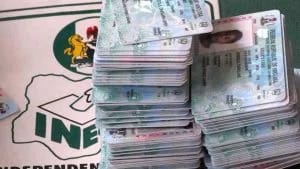News
Election Process Incomplete Without Offenses Commission, according to INEC

Ibekimi Oriamaja Reports
Yesterday, the Independent National Electoral Commission (INEC) expressed support for a bill that would create an electoral crimes commission to prosecute election violators, stating that such a commission is necessary for a successful election.
At a one-day public hearing on the “Bill for an Act to Establish National Electoral Offenses Commission to Provide for the Legal Framework for Investigation and Prosecution of Electoral Offenses for the General Improvement of the Electoral Process in Nigeria,” Professor Mahmood Yakubu, the chairman of INEC, made this announcement in Abuja.
According to Yakubu, the new law would allow the commission to crack down on election crimes and ensure that offenders—particularly prominent politicians who fund thugs to do violent acts—were successfully prosecuted.
The bill’s Clause 44, which gives the Attorney General of the Federation the authority to establish rules and regulations governing the duties or powers of the proposed commission, was also subject to revision requests from the INEC chairman. Giving the AGF such authority, according to him, could interfere with the commission’s work because it should be independent.
Yakubu added that 60 convictions for electoral offenses had been obtained since the 2015 general election, the most recent of which was in Akwa Ibom State. Around 125 cases of electoral offenses had been filed in various courts since that time.
However, the bill was rejected by the Economic and Financial Crimes Commission (EFCC). The Independent Corrupt Practices and Other Related Offenses Commission (ICPC), the EFCC, the Nigeria Police, the Ministry of Justice, and even INEC (under Section 145 of the Electoral Act, 2022) were all given the authority to investigate and prosecute the offenses proposed therein, according to the EFCC.
Election-related crimes, according to Speaker of the House of Representatives, Hon. Femi Gbajabiamila, enable vote-riggers to seize power in opposition to the democratic will of the people.
The “Bill for an Act to Establish National Electoral Offences Commission to Provide for the Legal Framework for Investigation and Prosecution of Electoral Offenses for the General Improvement of the Electoral Process in Nigeria” had been passed through second reading by the House of Representatives at plenary on June 30.
The Chairman of the Committee on Electoral Matters, Hon. Aishatu Dukku, along with Hon. Kingsley Chinda and Hon. John Dyegh, sponsored the bill.
Clause 19 of the measure, which THISDAY was able to view in draft form, stipulates a 15-year prison sentence for impersonation, undue influence, and bribery. According to Clause 26, stealing, plundering, or destroying ballots or any other election documents is punishable by at least 20 years in prison or a fine of N40,000,000.
Yakubu argued that strict penalties for lawbreakers were necessary in order to properly modernize the election process. He bemoaned the fact that INEC was burdened with too many obligations under the Electoral Act, including the prosecution of electoral offenders, and claimed that this posed significant challenges for the agency.
The head of INEC stated that the commission looked forward to the day when powerful individuals who sponsored thuggery would be detained and charged.
Yakubu sought amendment to Clause 33, which gave the Federal High Court, a State High Court, or the High Court of Abuja the jurisdiction to try alleged offenders, to provide for the setting up of electoral offences tribunals rather than granting the AGF additional powers, as provided for in Clause 44 of the proposed law. He emphasized that tribunals should be established with exclusive jurisdiction to trial electoral violators because the normal courts were overworked.
In order to avoid the fate of earlier attempts, which were inchoate at the end of the assembly’s existence, Yakubu said he was optimistic that the National Assembly would pass the law in the coming months.
The National Electoral Offenses Commission Act Bill is a crucial piece of legislation, according to INEC Chairman. For the past 13 years, it has been discussed in every national discussion of constitutional and electoral reforms.
Following the 2011 post-election violence, the Sheikh Ahmed Lemu Committee and, most recently, the Senator Ken Nnamani Committee on Constitutional and Electoral Reform, all endorsed the recommendation made by the Justice Mohammed Uwais Committee on Electoral Reforms in 2009.
“In addition to our duties, the commission is required to bring cases against anyone who violate electoral laws. However, the Uwais and Nnamani committees suggested that the commission be unbundled and some of its numerous responsibilities delegated to other agencies as a result of the commission’s inability to make arrests of offenders or conduct investigations that result in successful prosecution of offenders, particularly the high-profile offenders.
“We feel that the National Electoral Offences Body should be considered as an exception for those who contend that the solution does not lie in enlarging the federal bureaucracy by establishing a new commission. Although there are other security organizations that deal with economic and financial crimes, I have yet to hear anyone who honestly believes that the establishment of the anti-corruption authorities was unnecessary.
However, Abdulrasheed Bawa, the chairman of the EFCC, who was represented by Assistant Commander Deborah Ademu-Eteh, argued that it was unnecessary to establish a separate organization just for the purpose of pursuing electoral offenses, especially given that elections were only held seasonally.
Instead of establishing a new agency, Bawa recommended that the current law enforcement organizations be enhanced to achieve maximum performance.
While expressing support for the legislation in their goodwill message, Executive Director of Policy and Legal Advocacy Centre (PLAC), Clement Nwankwo, suggested that the 20 years in prison and N40 million fine set forth in Clause 26 of the proposed law be reduced in accordance with reality.
“The penalties in a law must be proportionate to the offence identified,” said Nwankwo. Looking at the proposals from the electoral offences commission, one of them states that stealing a ballot should result in at least 20 years in prison. That is, in my opinion, excessive. The N40 million fee imposed on individuals swarming around and stealing voting boxes undoubtedly cannot be paid, and their sponsors will flee away, leaving them to bear the brunt of it.
Yusuf Sani, the chairman of the Inter-party Advisory Council (IPAC), argued in favor of the bill and stated that the political parties were still working on their contributions.
When the Electoral Act of 2022 was passed, some of us were concerned about how the bill’s provisions would be enforced, according to Sani. It was like owning a bulldog that is incapable of biting. I think this is what Nigeria needs in order to have a credible, fair, and inclusive election.
If you look at this law, it is about how political parties, our members, and even the electorate can behave during the election. Of course, we have our inputs, which we are still working on.
“As a result, we must conduct a thorough study of the information we have. We applaud the move because we think it will create a highly organized environment where there will be no room for impunity. As we saw today, Nigeria will gain respect in the community of nations.
Sani also noted that certain groups were not mentioned in the proposed commission’s membership. Because all we are seeing are people from the government establishments, he continued, “We are thinking that if at least one or two of them are included in the membership of the commission, perhaps it will bring the interest of the public to be protected more than hitherto.”
Gbajabiamila acknowledged that the recent governorship elections in Ekiti and Osun states marked an important turning point in Nigeria’s democratic development. Gbajabiamila was represented at the event by his deputy, Hon. Idris Wase. Without a doubt, he said, there was still much to be done to get the nation to the point where there would be no challenges from fraud, violence, or abuse of the electoral process.
-

 Politics5 days ago
Politics5 days agoPROPHESY TO PRESIDENT BOLA AHMED TINUBU ABOUT 2027
-

 News5 days ago
News5 days agoFamily, Friends Celebrate Jailed Former Deputy Senate President, Ike Ekweremadu’s Birthday
-

 Business3 days ago
Business3 days agoNigeria’s Azikiel Refinery to Begin Operations in 2025
-

 Business5 days ago
Business5 days agoBaraza: Bribena pleads for understanding, highlights solutions to organization’s problems
-

 Politics5 days ago
Politics5 days agoFubara Swears-in Dagogo as Attorney-General, to Probe Wike’s 8 Years As Governor
-

 Politics2 days ago
Politics2 days agoYou Have a Few Days to go, Gov. Fubara Tells LGA Chairmen
-

 Business5 days ago
Business5 days agoGunmen kidnap Dangote cement workers in Edo
-

 Crime5 days ago
Crime5 days ago$2.5bn fraud: EFCC to collaborate with UK prosecutors in Diezani’s case








